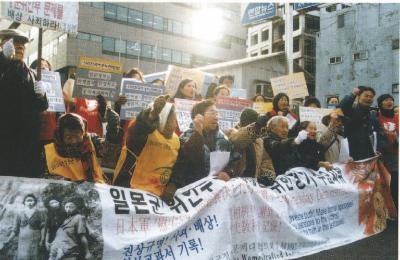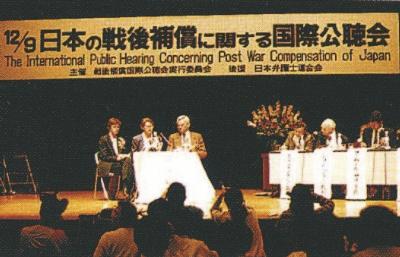- Comfort Women
- The truth of the Japanese Military "Comfort Women"
Comfort Women
Table of Contents Open Contents
5.Did Japan offer sufficient apology and compensation?
On June 26, 2007, the U.S. House of Representatives Foreign Affairs Committee passed House Resolution 121 by overwhelming majority, which calls on Japan to “formally acknowledge, apologize, and accept historical responsibility in a clear and unequivocal manner for its Imperial Armed Force’s coercion of young women into sexual slavery.”
The Japanese government claimed that it has already apologized for “comfort women system.” The “apology” is said to be the 1992 statement made by Chief Cabinet Secretary Kato Koichi and another one made by his successor Kono Yohei in the following year. In the Kono Statement, the Japanese government admitted and apologized for the involvement of the Japanese armed forces and coercion in recruitment.
Despite these apologies, however, the Japanese government has consistently disclaimed any legal responsibility on this issue. Yet it created the Asian Women’s Fund, based on the idea that Japan would take moral responsibility towards the “comfort women” from a humanitarian standpoint.
Established in 1995, the Asian Women’s Fund implemented atonement projects by collecting money from Japanese citizens on a voluntary basis. Due to the lack of response from the former “comfort women,” the Fund ended operations in March, 2007, without any notable achievement.
While criticizing the Japanese government for doing nothing over the “comfort women” issue is incorrect, it is also inaccurate to say that all the problems were resolved or that Japan has “shown its best efforts.”
It is necessary to ask why reconciliation has not been achieved between Japan and its neighbors and why compensation has not been made to former “comfort women” in spite of the Kono Statement and the Asian Women’s Fund.
Did the Japanese government offer sufficient apology and compensation in an appropriate manner?
It can be safely said that these problems are well laid in House Resolution 121, introduced by U.S. Representative Mike Honda (D-CA). The major provisions of House Resolution
121 are:
- The Japanese government should formally acknowledge the Japanese Imperial Army’s coercion of young women into sexual slavery (the presence of “comfort women”) and apologize to them.
- The Prime Minister of Japan should apologize in his official capacity.
- The Japanese government should publicly refute claims that the “comfort women” system never existed.
- The Japanese government should follow the recommendations of the international community and educate current and future generations about the “comfort women” system.
Although apologies were made by Japanese Prime Ministers as individuals, they were not approved by the Diet or the Government. Nor was the Kono Statement passed in the Diet. In short, no official apology has been offered by the state of Japan, which was wholly responsible for the plight of the “comfort women.”
Asia Women's Fund
In 1995, Japan set up an "Asia Women's Fund" for atonement in the form of material compensation and to provide each surviving comfort woman with a signed apology from the prime minister, stating "As Prime Minister of Japan, I thus extend anew my most sincere apologies and remorse to all the women who underwent immeasurable and painful experiences and suffered incurable physical and psychological wounds as comfort women." The fund is funded by private donations and not government money, and has been criticized as a way to avoid admitting government abuse. But because of the unofficial nature of the fund, many comfort women have rejected these payments and continue to seek an official apology and compensation.
Presented as an agenda item for the United Nations Human Rights Commission by the Korean Council for the Women Drafted for Military Sexual Slavery by Japan in 1992, the “comfort women” problem has been regarded as a human rights violation. Recommendations have been made by UN organizations to the Japanese government to issue an official apology to the victims and to face its legal responsibility. These recommendations remain unfulfilled, and the world is watching to see if Japan will ever face its past and educate its youth about Japan’s past mistakes.
Radhika Coomaraswamy’ reports to the United Nations Commission on Human Rights
In her reports, she has written on violence in the family, violence in the community, violence against women during armed conflict and the problem of international trafficking. A strong advocate on women’s rights, she has intervened on behalf of women throughout the world seeking clarification from Governments in cases involving violence against women. She has also conducted field visits to Japan and Korea on the problem of "comfort women", Rwanda, Colombia, Haiti, Indonesia with regard to violence against women in war time, Poland, India, Bangladesh and Nepal on the issue of trafficking, the United States on women in prisons, Brazil on domestic violence and Cuba on violence against women generally.
Demands by the victims
In this context, the Special Rapporteur would like to reflect in detail the concrete demands made by the former "comfort women" who want their voices to be heard by the international community and by the Government of Japan in particular. In response to questions raised by the Special Rapporteur most former "comfort women” informed the Special Rapporteur that the Government of Japan should:
(a) Apologize individually to each of the surviving women for the suffering they have had to endure. … In addition, most victims felt that the apologies made at the time of the mission of Prime Minister Murayama were not sincere enough, especially because his statement had not been endorsed by the Japanese Diet;
(b) Recognize that the drafting of approximately 200,000 Korean women as military sexual slaves and the establishment of comfort houses for the use of the Japanese Imperial Army were carried out in a systematic and forcible manner by and/or with the knowledge of the Government and the army command;
(c) Recognize that the systematic recruitment of women for purposes of sexual slavery should be considered a crime against humanity, a gross violation of international humanitarian law, and a crime against peace, as well as a crime of slavery, trafficking in persons and of forced prostitution;
(d) Accept moral and legal responsibility for such crimes;
(e) Pay compensation from governmental resources to the surviving victims. For this purpose, it was suggested that the Government of Japan should enact special legislation to enable a settlement of individual claims for compensation through civil law suits at Japanese municipal courts.
……In addition, the former "comfort women" are requesting the following measures to be taken by the Government of Japan:
(a) A thorough investigation into the historical facts of the issue of military sexual slavery during the Second World War, including publicizing all official documents and materials on the matter still existent in Japan and, in particular, in official governmental archives;
(b) The amendment of Japanese history books and educational curricula to reflect the historical facts which would have emerged from the investigation;
(c) The identification and prosecution, under Japanese domestic law, of all perpetrators involved in the recruitment of military sexual slaves and the institutionalization of military sexual slavery.
The Radhika Coomaraswamy reports


















